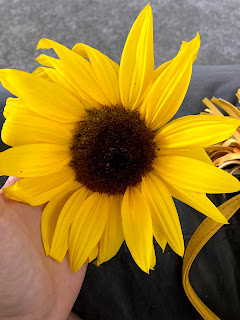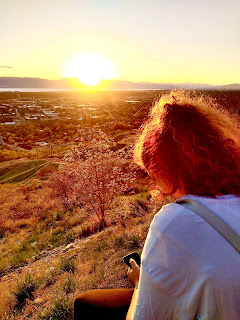A Take On "Difficult Conversations"
It's been a while. I guess, with the pandemic and near daily apocalyptic happenings, I didn't know how to adequately write about anything. Between people not taking the pandemic seriously, renewed conversations about systemic racism and human trafficking, the tragedy that is the election this year, and a million other tiny fires along the way, I didn't know what the right thing to say was. Because I come from a relatively privileged situation, I often wonder if it even is my place to say anything--shouldn't I be using the position I am to amplify the voices of the people who are actively hurting?
However, I've gotten well and tired of sitting and watching and worrying that my contribution in this apparently penultimate era of the world will be sitting and watching and worrying and sharing a few posts by people I feel are more eloquent than I. So, I make an attempt at putting my two cents into this global conversation.
Over the past few months, I have seen countless articles and posts talking about having "difficult conversations". The topics of these conversations range from companies and state mandates and guidelines (or more accurately, lack thereof) on COVID-19, to discussions of the racism that is still very much built into our society, to the number of people in power who are still selling human beings into slavery, to conversations about controversies in the history of my own faith. Nearly every time any issue is brought up, we say that it's "time" to have these tough conversations.
I'd like to ask, for whom are these conversations tough?
Because I don't want to step on the toes of people who actually experience some of the hardships and injustices that I've mentioned, I don't want to frame this through the lens of racism or trafficking, since I have personally never suffered at the hands of either of these cruelties. However, as someone who is a woman and is living with mental illness and working a job that is impossible to do from home, as well as having a younger brother who is an essential worker, I can frame this question through these lenses of my experience.
I've worked mostly in customer service, until recently. As such, I was pretty used to not actually getting treated in the most respectful of ways, both as a worker and also as a woman. I vividly remember begging my boss at my first job to ask a customer to leave who had made a habit of staying past closing to watch me as I worked behind the counter. I've worked jobs that threatened my position within the company when I was running a fever and didn't feel ethically physically well enough to come in. I've often worked 6-8 hour shifts where I didn't receive more than a fifteen minute break. On top of that, I have never worked a "livable wage".
In the wake of *everything* there have been many people calling into question the way our economy works, as evidently it is worth losing over 100,000 lives to keep the country running because our system doesn't work without deciding some people are simply "expendable". This is categorized as a tough conversation. And to some extent, it is. It's hard to look at a system that is broken in ways you hadn't considered and try to decide what, and how, to change. However, for the people who are the most hurt by the country's reactions to the virus, it's a conversation they (and we) have wanted to have for a long time. I can't tell you the first time I realized the system was broken, because for most of my life I wanted to pursue art. I knew that even though entertainment and art are some of the most important aspects of human enrichment, it isn't valued among our society. I have had to defend my passions for as long as I can remember, because years ago I decided doing something that made life worth living to me was more important than making a lot of money. On top of that, the people who are just now talking about the awful conditions customer service and other essential workers operate under are way behind the curve. We've been complaining about being overpaid and overworked and disrespected for years.
I also live with several decently debilitating mental illnesses. I am well aware of the ways in which life is harder for me not only because of these illnesses, but the way our society is structured. Every job I have worked I have had the opportunity to voluntarily fill out a disability form, for the purpose of recording diversity in the workplace. Although legally I cannot be fired for my disability, I will always have to wonder if someone will read about my disorders and look for another reason to let me go. I have to apply and receive accommodations at my university each semester, but just because the school gives me the form doesn't necessarily mean my professors will adhere to everything. In high school, I should have been institutionalized, but because I was so worried about appearing "normal" or "strong" despite my challenges, I lied to every doctor and adult that could have helped me. I didn't want that following me for the rest of my life. I never let myself take a break, because I needed to appear "high functioning" to be taken seriously. To this day, I struggle asking for the help and support I need, and constantly work to appear less affected by things, in order to not look like I need to be "babied" when I genuinely would just like a little empathy and care. And yet, we still have to have "difficult" conversations about stigma and struggles for mentally ill and otherwise disabled people.
Finally, on the topic of gender. Similar to race, we struggle as a whole accepting that sexism is still in our society. It is also a systemic issue. As in the case of racism, women have to constantly try and speak over the people who shout that women are too sensitive and equality is achieved. We still have to "prove" ourselves in order to contribute to a conversation about ourselves. I have been involved in countless "difficult" discussions about gender.
And you know what? None of these issues have conversations that are actually "difficult" to me. See, I already understand that there's something wrong with what's been going on. I've wanted to have these conversations, but you weren't listening. The only thing that's difficult about these conversations is that other people insist they know more about something that I am actually experiencing, that they've only ever viewed from a second-hand, privileged position.
These conversations are difficult because they deal with things we may not have experienced first-hand, and far too often we neglect to consider that perhaps this means we are not the most qualified to speak on. We struggle to have conversations because it's hard to believe that other people don't live life in the exact same way we do. It is understandable--the only life experience we are intimately familiar with is our own--but it is not excusable. It's not good enough to hide behind the arguments of "I don't see racism/classism/sexism/homophobia/abelism", because if you aren't someone that's being harmed by these issues it's a lot harder to see. Other people's pain is a lot easier to dismiss than our own, because we aren't feeling for anyone else.
I want to believe the best about people and the world. Despite the odds, I feel I remain a fairly optimistic person, as far as the future goes. However, that doesn't mean I don't see the place or need for conversations that are uncomfortable. I am still learning every day about how my position as an educated, white American benefits me in ways I can take no credit for, and do not deserve more than anyone else. Wanting the world to be better than it is does not necessarily mean you are, or have to be, bitter about it now. That being said, I don't blame or judge the people who are bitter. It's hard to get hurt by system that hides behind a facade of "Everyone can succeed" or "Hard work pays off!" or "Land of the Free". Being bitter does not strip someone of the validity of their experience.
Of course we can do better when it comes to reactions to injustice--but that goes for both sides. It's important to remember that things rarely escalate without perceived (and often actual) just cause. It's important to remember that everyone is at a different place on the journey of being aware and fighting for change. We are all growing. None of us are perfect people, with perfect reactions or views. It's part of being human. However, acknowledging our own imperfection, and being humble enough to learn from people with different experiences than ours is essential to our progression.
An integral part of my religious belief is the idea that I serve my Heavenly Parents and Savior best by serving those who do not have the same privileges that I have, in lifting them to have those same wonderful opportunities as I. I believe the best way I can serve those who do not have the same chances as me is partially to listen to them when they are hurting. It is also to do my part to dismantle the systems in place that would harm them without any additional human interference, as well as to work through my own biases and prejudices. As I said a few months ago, mourning with those who mourn is not conditional on my comprehension on what they mourn over. We are stewards of this earth, and helpmeets of those who live upon in.
As a final conclusion, wash your hands AND wear a mask AND practice social distancing. All lives cannot matter UNTIL black lives matter just as much as white lives. Human trafficking is wrong. Erase the stigma surrounding mental illness. Normalize therapy. Respect women, because historically they do receive less respect. Believe victims. Love unconditionally. Human rights belong to ALL humans, and the pursuit of happiness is a human right, even if someone else's happiness looks different than yours. Respect other people's gender identities and sexualities, because they are their own.
We can do so much good. We are smart enough to change the systems in place when they are harming other people. We are good enough to change them. We just have to actually start. The time for difficult conversations is past. It is time for difficult actions.



Comments
Post a Comment